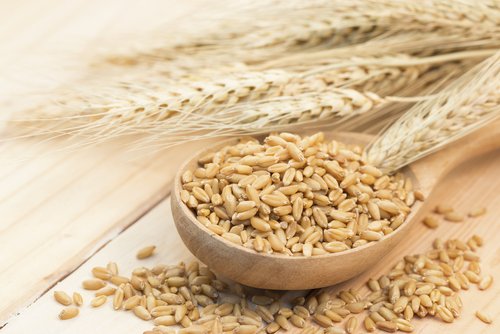How to Treat Pharyngitis Naturally

Most commonly observed in the winter, pharyngitis is a bacterial infection, just like a cold. We’ve come along way with learning how to treat pharyngitis, though.
Inflammation of the pharynx can be helped by remedies that you can make at home. In today’s article, we’ll tell you more about them.
What you need to know about pharyngitis
The pharynx is a muscular organ located behind the nose and the mouth. It extends to the neck where it joins the esophagus and larynx.
Your pharynx a very important part of your anatomy because it directs air to your larynx and directs food to your esophagus.
However, the air you breathe and the food you eat can inflame this area and cause pharyngitis.
Some of its main symptoms include the following:
- Pain when swallowing
- Mild itching
- Mild cough
- Mucus secretions
- Feelings of dryness
When pharyngitis is acute, it’s usually accompanied by a cold.
Chronic pharyngitis typically appears in people who smoke or drink, who use their voice regularly (singers, sports announcers, public speakers), or who suffer from a deviated nasal septum or sinusitis.
However, children between the ages of five and 15 are more prone to getting strep throat. This illness is contagious and more common in winter. It’s caused by a group A bacterium (Streptococcus), and symptoms include:
- White spots in the throat
- Fever
- Sore throat
- Redness in the tonsils
- Loss of appetite
- Difficulty swallowing
We recommend reading: How to soothe swollen tonsils
Home remedies to help treat pharyngitis

Sore throats are common during the colder months. In most cases, no medical treatment is needed. Typically, it’s sufficient to rest, drink warm teas, and wait a bit.
In the case of pharyngitis, doctors typically don’t prescribe any medications to treat pharyngitis unless they think there’s a serious risk of infection. Prescription antibiotics usually have no more than a tiny effect on the symptoms and duration of this condition.
Therefore, we recommend the following natural treatments that may speed up your recovery. Today, we’ll take a look at some of them.
1. Thyme
Thyme is very effective thanks to its anti-inflammatory and analgesic properties. You can drink thyme tea or gargle it several times a day.
Ingredients
- A cup of water (250 ml)
- 1 tablespoon of thyme (10 g)
- 1 tablespoon of honey (25 g)
Preparation
- First, heat the water until it boils.
- Remove from heat and add the thyme.
- Then, cover and allow it to sit for 10 minutes.
- Strain the liquid and sweeten with honey.
- Drink this tea as hot as possible.
- If you’re gargling it, do not sweeten it.
2. Whole-grain barley

Ingredients
- 1/4 cup of ground whole-grain barley (27 g)
- 4 cups of water (1 liter)
- 2 tablespoons of honey (50 g)
Preparation
- First, add the water and the barley to a saucepan.
- Then, heat until the water boils and simmer for 30 minutes.
- Remove from heat and strain the liquid.
- Add the honey and stir well.
- Gargle with this liquid several times a day.
3. Apple cider vinegar
This useful ingredient is ideal for strep throat.
Plus, the properties of vinegar also stimulate your immune system to fight infection.
Ingredients
- 1 cup of water (250 ml)
- 3 tablespoons of apple cider vinegar (30 ml)
Preparation
- Simply mix the water and apple cider vinegar together.
- Gargle with this two to three times a day. Don’t swallow it.
4. Sage

- 1 cup of water (250 ml)
- 2 tablespoons of sage leaves (20 g)
Preparation
- First, heat the water to a boil and add the sage leaves.
- Then, simmer for 15 minutes, remove from heat, and cover for 10 minutes.
- Strain the liquid. Then, when it has reached a comfortable temperature, gargle it.
- Repeat this several times a day.
5. Tomato
This treatment is not only effective in relieving the discomfort associated with pharyngitis. In addition, it also provides you with the nutrients you need to strengthen your immune system.
We suggest you consume it on an empty stomach for a week.
Ingredients
- 2 tomatoes
- 1/2 cup of water (125 ml)
Preparation
- First, wash the tomatoes and quarter them.
- Then, remove the seeds and add them to the blender.
- Add water and process well.
- Drink immediately.
6. Cayenne pepper
Often used in the preparation of Asian and Indian dishes, cayenne pepper is an effective home remedy for strep throat.
This spice is known for its strong flavor and the anti-inflammatory and antibacterial properties thanks to a compound known as capsaicin.
This helps eliminate any toxins that can cause infection.
Ingredients
- 3 cloves of garlic
- 1/4 teaspoon of ground cayenne pepper (2 g)
- 1 tablespoon of honey (25 g)
Preparation
- First, cut the garlic cloves in half and remove the center (the germ).
- Then, crush them and place them in a bowl.
- Add the cayenne pepper and honey.
- Mix well and consume this on an empty stomach.
- Drink a cup of water immediately afterwards.
- Repeat this at noon and at night.
7. Milk
Warm milk can be comforting at night when you’re sick or it’s cold out. It helps you fall asleep and can also contains plenty of vitamins, so it’s a good natural way to treat pharyngitis.
When you combine milk with antibacterial ingredients like honey or turmeric, the benefits are even greater.
Ingredients
- 1 cup of milk (250 ml)
- 1 tablespoon of honey (25 g) or 1 teaspoon of ground turmeric (5 g)
Preparation
- Heat the milk in a saucepan or in the microwave.
- Then, add the honey or turmeric and mix well.
- Drink this as warm as possible.
All cited sources were thoroughly reviewed by our team to ensure their quality, reliability, currency, and validity. The bibliography of this article was considered reliable and of academic or scientific accuracy.
- Ran D. Goldman, “Honey for treatment of cough in children”, Can Fam Physician. 2014 Dec; 60(12): 1107–1110.
- Hubbert M et al. “Efficacy and tolerability of a spray with Salvia officinalis in the treatment of acute pharyngitis – a randomised, double-blind, placebo-controlled study with adaptive design and interim analysis”, Eur J Med Res. 2006 Jan 31;11(1):20-6.
- Judy Gopal, “Authenticating apple cider vinegar’s home remedy claims: antibacterial, antifungal, antiviral properties and cytotoxicity aspect”, Natural Product Research, 2017. https://www.tandfonline.com/doi/full/10.1080/14786419.2017.1413567
- Eqbal M. A. Dauqan1, “Medicinal and Functional Values of Thyme (Thymus vulgaris L.) Herb”, Journal of Applied Biology & Biotechnology Vol. 5 (02), pp. 017-022, March-April, 2017, DOI: 10.7324/JABB.2017.50203
-
Emanuela Marini et al. “Antimicrobial and Anti-Virulence Activity of Capsaicin Against Erythromycin-Resistant, Cell-Invasive Group A Streptococci”, Front Microbiol. 2015; 6: 1281.
This text is provided for informational purposes only and does not replace consultation with a professional. If in doubt, consult your specialist.








